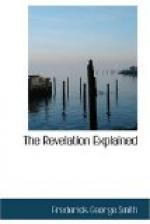Frederick related the foregoing to his brother John, the Duke of York, on the morning of Oct. 31, 1517, stating that he had dreamed it during the previous night. The same day at noon Martin Luther advanced boldly to the chapel at Wittemberg and posted upon the door ninety-five theses, or propositions, against the Papal doctrine of indulgences. This was his public entrance upon the great work of reformation. The importance of the Reformation of the Sixteenth Century is incalculable. It gave the deathblow to the universal spiritual supremacy of Rome. As we have already seen, the Papacy had for centuries held despotic sway over the minds and the consciences of men. One potent cause of the Reformation was the great Revival of Learning that marked the close of the medieval and the beginning of the modern period of history. This great mental awakening contrasted sharply with the blind ignorance and superstition of the Middle Ages, and caused many men to doubt the Scriptural authority of many of the doctrines and ceremonies of the Church of Rome; such as invocation of saints, auricular confession, use of images, worship of the Virgin Mary, etc.
Scandals and abuses in the Church of Rome also hastened the Reformation. During the fifteenth century the morals of that church had sunk to the greatest depths of iniquity. The Popes themselves were, in some cases, monsters of impurity and iniquity, insomuch that historians are obliged to draw the vail over many of their dark deeds.




